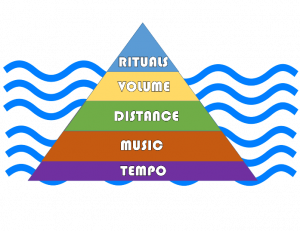 Father Michael Oleska was invited to speak at the Oregon Department of Transportation’s Fall Diversity Conference in 2014. Hosted at the Salem Convention Center, Father Oleska spoke in the ballroom in front of hundreds of state employees. He called his speech the Icebergs of Miscommunication (Oleska, 2014). The images in Figure 1 below illustrate the basics of his presentation. In the arctic, one can only see the tip of the iceberg while most of the mass is below the water surface. Father Oleska correlates this anomaly with miscommunication, all of the aspects of communication one can’t know just by looking.
Father Michael Oleska was invited to speak at the Oregon Department of Transportation’s Fall Diversity Conference in 2014. Hosted at the Salem Convention Center, Father Oleska spoke in the ballroom in front of hundreds of state employees. He called his speech the Icebergs of Miscommunication (Oleska, 2014). The images in Figure 1 below illustrate the basics of his presentation. In the arctic, one can only see the tip of the iceberg while most of the mass is below the water surface. Father Oleska correlates this anomaly with miscommunication, all of the aspects of communication one can’t know just by looking.

The largest aspect of miscommunication is the tempo of our lives. Each person develops their tempo in the womb, by hearing the voices of their mother and father. In northeastern parts of the United States, the general tempo of life is fast-paced and busy. While in the southern states, the general tempo is slow and relaxed.
When citizens of these regions get together, they can have miscommunication just in the speed of answering common questions. For example, a New York teacher is lecturing at a southern school. He asks the class for the answer to the math problem 2×2. The class is slow to respond and the teacher gets frustrated with the amount of time it takes for them to answer the question. He decides that the class is illiterate and requires them to perform remedial homework to practice their arithmetic.
What did the teacher forget to consider?
The next largest aspect of miscommunication is the music of our language. The English language is a very tonal language where one could say the same word in two different ways and accomplish two different definitions. For example, when you address your mother to ask for a cookie versus complaining about her slow driving – the tone in which you say ‘Ma’ is very different (McWhorter, 2015). Therefore, when someone who is accustomed to speaking in a monotone way tries to communicate in a tonal atmosphere, their message could easily be misconstrued. This simple miscommunication could create distance between the communicators.
In the United States, it is common for people to have a personal space limitation in which they are uncomfortable when someone enters that space. In an excerpt from the Washington Post, the author describes how researchers categorize this phenomenon.
Temperature tends to affect how people define personal space. So do gender and age. But, they think, our personal boundaries have a lot to do with where we grow up. These researchers sort the world into “contact cultures” (South America, the Middle East, Southern Europe) and “non-contact cultures” (Northern Europe, North America, Asia) (Erickson, 2017).
The invasion of personal space can make some people uncomfortable, and subconsciously they may take a physical step back. Often this type of gesture may come off as insulting, even if the intention was not meant to be so.
The volume of one’s voice can also be the subject of miscommunication. There are those people who genuinely have a loud voice. While they have no intention of seemingly yelling at anyone, when they get excited, their voice can naturally carry. Alternatively, some people – traditionally women – are naturally very soft spoken. This can elude to the impression that they are unsure of the subject in which they are communicating. Further, for those people who are hard of hearing, it can be frustrating for both sides of the conversation when they repeatedly ask for something to be said again.
The last aspect of miscommunication is the parts of the conversation that we can see and interact with the most. Rituals can vary in meaning throughout each culture. Deference by definition is humble submission and respect. Solidarity by definition is mutual support within a group (Oxford, n.d.). Deference in communication can be seen in America when someone says Good Morning and asks you how you are. Regardless of how your morning is actually going, the knee-jerk response is simply, ‘I’m fine, how are you?’. Solidarity in communication refers to rituals as seen in American culture, for example, when you feel compelled to say Good Bye on the phone before you hang up. Other cultures may encourage other variations of good-bye, while some cultures are accustomed to simply hanging up the phone, with no closure to the conversation. If I hung up on my mother without saying Good Bye, not only would she immediately call back, I would get an earful about it for a week – not only from her, but from my father too!
Miscommunication is the starting point for most all disagreements. It can cause heartache, destroy productivity and morale. The underlying theme of Father Oleska’s presentation was tolerance. Through education of these aspects of miscommunication, and the allowance of grace towards our fellow man, we as a society can create an atmosphere of understanding. Steven Covey touches on the subject in his book, 7 Habits of Highly Effective People, where he instructs readers to first seek to understand, then to be understood (Sturm, 2016). This simple philosophy has the potential to create deeper relationships in our personal and professional lives. Effective communication is the framework for effective teams, and therefore, for successful companies.
Sarah Terry is a GovLoop Featured Contributor. She works with the Oregon Department of Transportation. She currently works in the Construction Section as an Administrative Specialist. She assists the Construction Training Program which certifies all of the inspectors and contractors for the State of Oregon. She also writes articles for the Construction Section that are featured in the Inside ODOT, an internal online publication circulated throughout the Highway Division. Some of her previous articles are also published in the APWA Reporter. Sarah enjoys gardening, backpacking, and adventuring with her two boxers Giselle and Leia.





Leave a Reply
You must be logged in to post a comment.